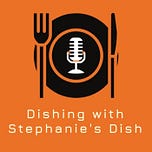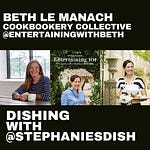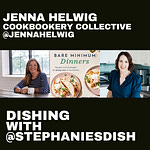Stephanie [00:00:16]:
Hello, everybody, and welcome to Dishing with Stephanie's Dish, the podcast where we talk to people that have written unique, amazing, and in this case, super fun books about food. I'm here with Judith Chishon, and she is a friend of a friend sister, which is fun to talk with her, too. Susie Mindrum is her sister, who's a good friend of our families and has been so kind to me and my stepmom. So it's fun to talk with you, Judith. She reached out and said, Would you ever want to talk to my sister? She has this funny book called “Romaine Wasn't Built in a Day”.
Judith [00:00:53]:
Sister in law.
Stephanie [00:00:54]:
Okay. Sister in law. It's amazing.
Judith [00:00:58]:
Yeah.
Stephanie [00:00:59]:
So do we call you? Is it an entomologist? The person who studies the nature of words?
Judith [00:01:08]:
Yeah. Etymologist no, n otherwise people might think it pertains to bugs.
Stephanie [00:01:16]:
Yes, that's right. So etymology is the derivative of words.
Judith [00:01:22]:
Yeah, right.
Stephanie [00:01:24]:
How did you think of putting this book together? Because why don't you describe it in your own words? Okay.
Judith [00:01:31]:
A somewhat short answer as to how it came about. I specialized in Old English and Middle English in graduate school, and as a professor, I had the great good fortune to teach history of the language, which, of course, included many discussions about the immense vocabulary of English and where all those words came from. And over the course of many, many years, I had amassed a huge pile of notes about interesting word histories. And then when the Pandemic hit, I put them all together into a book.
Stephanie [00:02:17]:
Isn't it amazing how many books were spawned by the pandemic?
Judith [00:02:22]:
Yes, really, it is.
Stephanie [00:02:26]:
And do you have a personal love of food or why this focus specifically on food words?
Judith [00:02:33]:
Yeah. Well, that's a good question. Yes. I love food. I am very interested in the history of food. I taught a course once long ago on food and literature, and often even in other courses, talked about the role that literature, that food played in a book. But the first love, I guess, was words. Even as a kid, I mean, all kids love to play with words, rhyming and punning and doing Dr. Susan kinds of things. And if I can indulge in one anecdote that's popping into my head right now about a love of language, even as a kid, I don't know how old I was maybe seven, eight, something like that. We were sitting around the table at my grandmother and grandfather's house, and he was holding forth with an anecdote, the punchline to, which was in Norwegian. And everybody burst out laughing, probably including me, though I didn't understand what he had said. I had a few words of Norwegian, that was it. But it really stands out in my head that a kind of moment of paying attention to the medium, perhaps, rather than the message that it was funny for everybody, maybe because literally what he said, but also because he said it in another language. We call that code switching now, and I wouldn't have articulated the whole business the way I am now, but it was a fun moment of awareness of I'm going to call it the ludic quality of language meaning the playfulness and all the things that we can do with language. Like tell jokes.
Stephanie [00:04:39]:
Yeah. And the lyricism of it. Right.
Judith [00:04:42]:
Yes. And I was a dictionary reader even at a young age. I don't know why exactly.
Stephanie [00:04:50]:
It makes me laugh that you just said that, like we're all dictionary readers. You read the dictionary as a young kid.
Judith [00:04:58]:
Yeah. I remember looking up words and making marks in the book. And I love the word pugnacious. Who knows why?
Stephanie [00:05:09]:
Right.
Judith [00:05:10]:
And naughty words were sometimes in there. Although I admit I was using a very old punk and wagon's dictionary, which did not have very many naughty words. Yeah. I've just always really loved digging around in the dictionary.
Stephanie [00:05:28]:
Have you by chance read and I think the book is called The Book of Words. It's about the writing of the dictionary from the female perspective.
Judith [00:05:39]:
Well, I've read a number of books like that. Is it the one by Corey Stamford? Word by word?
Stephanie [00:05:48]:
Maybe. Oh, I just read it, and I'm sorry that I don't know the name of the author. I will try and find it.
Judith [00:05:57]:
Okay. I've got it sitting here in this big pile of books.
Stephanie [00:06:03]:
Yeah. It was basically just this idea of how the dictionary came to be and how they chronicled and cataloged the words. And it was fiction.
Judith [00:06:15]:
It was fiction.
Stephanie [00:06:17]:
It was but I think it was based in historical fiction, and it was just something go ahead.
Judith [00:06:25]:
No, that sounds fantastic.
Stephanie [00:06:27]:
Yeah. It was just something I had never really thought about. Here's the name of it. It is called lost words. I'm going to find it. Sorry. I just think you would really like it. And it was absolutely very beautifully written. The Dictionary of Lost Words is what it was called. And it was written by a woman named Pip Williams. K. Okay. Pip Williams. And the idea was they sort of chronicled this historical fiction of the creating of the dictionary. But also what was unique about the book was this idea that women had their own language and women of the aristocracy, their language was different than women that were working in the homes or were working in the markets and were lower caste women, as it were. So she became enamored with chronicling and cataloging the words that women use that didn't make it into the original dictionaries.
Judith [00:07:35]:
Interesting. Well, I definitely want to read it. And she was talking about English, or was she talking worldwide?
Stephanie [00:07:43]:
It was in England, and it was the Oxford Dictionary compilation.
Judith [00:07:49]:
Okay, so it's a story about The OED.
Stephanie [00:07:51]:
Correct.
Judith [00:07:53]:
Okay. Yes.
Stephanie [00:07:54]:
I think you'd like it.
Judith [00:07:55]:
Yeah, I read the Madman story about the OED, but I haven't read this one specifically. Do you know if she has a lot of food words?
Stephanie [00:08:06]:
There is some, but it's not a lot that I could pick up because I think I would have recalled that. And when we were talking about preparing for this book, you were talking about the funny. We talked about rhubarb in particular because I'm obsessed with rhubarb. What is the origination of the word rhubarb?
Judith [00:08:27]:
It comes from a Greek word that means, well, the vegetable. But it means barbarous, too. So it's a foreign thing. That word foreign. And barbarous is in there. That's the barb part of rhubarb, which seems to me kind of fun and funny.
Stephanie [00:08:47]:
Yeah.
Judith [00:08:49]:
So I'm curious about your obsession with it. Food so often, of course, has emotional associations. And my association with rhubarb is a very positive one. Not only because my husband likes to make rhubarb pie and I love rhubarb pie, but it makes me think of my grandmother and her backyard in Northfield, Minnesota and a big rhubarb patch and the admonition that we should not ever even think about eating those leaves.
Stephanie [00:09:26]:
Yeah. Because they're poisonous.
Judith [00:09:27]:
Poisonous. And you'll die. But in spite of that, I mean, that only made it all more thrilling.
Stephanie [00:09:34]:
I think what I am fascinated by with rhubarb is that it's sort of this ugly looking weed in a lot of respects, and then it's not. If you just pull a stalk and eat it without a ton of sugar, it's not awesome. And then when you cut the leaves off and you boil that down or you cook it in a pastry and you add sugar, you make something completely transformative out of what is, in a lot of sense, zoeed I think that's what appeals to me, yes.
Judith [00:10:03]:
Well, wow. That is the magic, the transformation, right. That we can eat that stuff, but then it has to be cooked. Yeah. And when I think of rhubarb, I think of recipes that promise this transformation. I just love recipes, though I am not a recipe writer. I mean, I'm certainly not a cookbook writer. So I'm full of admiration for anybody who has written books with lots of recipes in them and all that that entails. But I just love the idea that you can have a list of rules and ingredients that promise transformation and something tasty and wonderful. And I think of it, too, in another way that's maybe kind of odd. I think of recipe cards that I have in my little old recipe card thingy holder, and I think of the handwriting that's on them. So in some cases, it's my mother's very neat handwriting. The Palmer method, that was not long ago. And in other cases, it's my grandmother's handwriting, the one who had rhubarb in the backyard. And hers tended to be shorter. I mean, she wouldn't give well, this doesn't account for the length of the recipe, but she wouldn't give a precise number for the oven setting. She would say hot oven or the precise measurement of, I don't know, flour is just scant. And somehow I liked that, that they were kind of abbreviated because she assumed you knew what to do.
Stephanie [00:11:52]:
Yeah. That's so funny, because in a lot of the recipes that my grandma left behind when I was writing a cookbook, trying to decipher what scamped was or what simmer, and just thinking about okay, like, a gas oven operates different than an electric oven. And so much of cooking can be intuitive. And I'm pretty good about intuiting, but I try to write it for my sister, who, if you don't say, ten minutes at 425 and test it with a toothpick, and if there's crumbs on there, keep going. She just has no idea. She has no intuition at all when it comes to cooking.
Judith [00:12:34]:
Yeah, well, I'm a little bit more in that category.
Stephanie [00:12:38]:
Yeah. And you have to spell it all out when we talk about some of the words in your book. What are some of your three to five favorite food words that you covered?
Judith [00:12:50]:
Okay, let me think for a minute, because those words change as to which is the favorite. At the moment, I am thinking of the word barbecue because I don't know a bunch of reasons. It comes from the Caribbean Arowakan word that means a frame that has many uses, but one of them is for roasting food. But there's a common theory about what barbecue means, that it comes from the French for barb, a cou, meaning beard to tail, presumably referring to the way you would spit the pig. Not a very pleasant idea.
Stephanie [00:13:40]:
Yes, you'd spirit from tip to tail.
Judith [00:13:42]:
Right. But there isn't any evidence for that, whereas there is evidence for this derivation from the Arawakan language. And to me, I just like to remember both. I'm very interested in false etymologies, or if you don't want to call them that, stories about words, because they suggest something interesting, too. I mean, in this case, it's a clever idea. It's based only on sound similarity. Sounds, of course, are incredibly important in trying to figure out the etymology, but that's not enough. And for dictionaries, there has to be written evidence, too. So I like the word barbecue. I like the word zydeco. I've been thinking about that a lot. The music from southern Louisiana. It's the Louisiana Creole pronunciation of lasarico, the French words for beans. The beans. And it apparently comes from a song title written by Clifton Sheny. And the title, or anyway, it's a line in the song, is something like Lazarico, pronounced zydaco son Pasale are not salted. I don't know what that means. I've dug around trying to get translations and explanations, and somebody said it means it's when you're serving just the beans and there's no meat or something.
Stephanie [00:15:19]:
Yeah, potentially, like a salt pork is missing.
Judith [00:15:23]:
Yeah. So I think that's fun. Zydeco means beans. That music. And I associate the word, then with the instruments, some of which are stringed instruments. I think of them as green beans.
Stephanie [00:15:36]:
Then I think about the actual artist named Buckwheat Zydeco, who sings zydeco.
Judith [00:15:41]:
Okay. I have to look.
Stephanie [00:15:43]:
Yeah, he's pretty great. He's from Orlando.
Judith [00:15:47]:
First name?
Stephanie [00:15:48]:
Yeah. He's just a great musician.
Judith [00:15:52]:
Okay. Thank you for that. And I like the word marathon because it's a toponym. The race named after a place in Greece where there was a famous marathon. And I like it because it has food hidden in the word. I mean, hidden to us, if we don't know Greek, it means fennel. In Greek, maratho. So it's food connected and toponym. That's interesting. Named after a place. Yeah.
Stephanie [00:16:20]:
What is a toponym? I've never heard of that term before.
Judith [00:16:24]:
A word that's named after a place. Okay. And there are also lots of eponyms words named after people, like, say, sandwich, which is a famous one, of course. Sandwich, just to confuse the issue, is also a place. Yes. And there's no evidence, really, that he did what he supposedly did, which was right. Hold a big sandwich, put all the meat and stuff between two pieces of bread, and hold it while he gambled with the other hand. So, in this case, it's a story. It's not the actual etymology. Nevertheless, it's clear that the word goes back to his name, his title. So, yeah, it's a word named after a person. I like words that have food hidden in them, too, like, seersucker, which comes from the Persian. That means milk and sugar.
Stephanie [00:17:26]:
Okay. And originally were suckers made with milk?
Judith [00:17:33]:
No, I think it's a pure coincidence that it sounds like sucker. Okay. It's from the Parisian, and I'd have to look up the precise words and pardon my inability to pronounce them, but it's like sugar and sugar. I mean, it's a word that means that means sugar, but in this case, it refers to the look of the material. Those words just got mushed together. Sucker. And the material looks like an alternating pattern of colors and maybe ones that have little bumps up and then the flat one, because Searsucker has those little material.
Stephanie [00:18:24]:
How long did it take you to research romaine wasn't built in a day, or were these just from the notes, and you had them all handy?
Judith [00:18:32]:
It's both. I did have notes for virtually all these words, but I checked them all. So it took day and night for a little more than a year, which seems to me pretty fast, but it was like day and night, and there's so much more I wanted to write, but I had a word limit.
Stephanie [00:18:52]:
Yes. Okay. One other question for you. You mentioned early on that you have taught classes about food literature and food books. Can you share with us, like, three of your favorite pieces of food literature or food books?
Judith [00:19:09]:
Okay, so this is just off the top of my head. I might have a longer and better answer if I thought about it. But I love The Odyssey for the references to food, much of which is all about being pious and giving food to the gods. They are constantly stopping to have what we would call a barbecue.
Stephanie [00:19:35]:
Sure.
Judith [00:19:35]:
It sounds as if they eat nothing but cow meat.
Stephanie [00:19:40]:
Yeah.
Judith [00:19:41]:
But it's all about piety and being civilized. And on the other hand, creatures they encounter, we might say people they encounter who don't do this. But somehow, invert the whole process of being host and guest, they are marked then as uncivilized. Like Polyphemus, who eats his guests.
Stephanie [00:20:07]:
Right.
Judith [00:20:10]:
And so many of the Greek myths that are just so fantastic about food and their use of food. But also, of course, The Canterbury Tales, because I love Chaucer.
Stephanie [00:20:23]:
Sure.
Judith [00:20:23]:
So in The Canterbury Tales, food is part of the original impetus for talking. They are about to set out on a journey, these nine and 20 in a compenia, these pilgrims. And at the end of it, there will be a meal, which is their reward, or it's especially a reward for the person who tells the best tale. So it's a competition and a thing that draws you on. And the thought of eating that makes you talk. Of course, they never do get to that meal. Yeah, that's a different story. What else? Well, I love the food in Tom Jones, that famous scene between him and the woman he's what, maybe for a second, thought to be the son of. And it's famous in its film version, the original film version, where she's eating oysters in seductive way and lots of 20th century literature. Can I think of even one? Salman Rushdie's book, Midnight's Children has fantastic interesting uses of food like pickles. And so that after a while you question, what does it mean to be pickled? Yeah, so many books.
Stephanie [00:21:54]:
I love it. Well, I never have thought about that book in that way. So I like that you got me to think about that. Your book has had a lot of interest. I was looking just at your reviews on Amazon and people are really loving it. It is. Romaine wasn't built in a day, and it's by Judith Chishon. And I'm impressed. I think it's really a fun book. And I love talking to you and thinking about all the things like COVID was such a weird time for so many of us, but also so prolific in the creative aspects.
Judith [00:22:31]:
Yes. When you had to be shut off from the world, at least somewhat. Yeah.
Stephanie [00:22:38]:
We found other things to do with our time. So do you think you have another book in you?
Judith [00:22:45]:
Yes, I feel like I have a bunch. I have many unfinished books, and I can't even say what's on the horizon. I have to hurry up and decide.
Stephanie [00:22:59]:
I understand. Well, it's been fun to talk to you. Thanks for spending time with me today. Talking about Romaine wasn't built in a day. It's real sweet.
Judith [00:23:08]:
Thank you. Thanks, Judith.
Stephanie [00:23:10]:
We'll talk soon.
Judith [00:23:11]:
Okay, bye.














Share this post